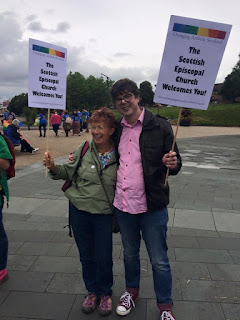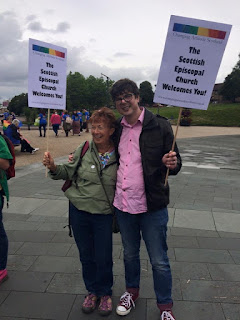 |
| Victorious table at dinner |
I'll deal with the latter first. The only commiserations I might have deserved lay in the fact that the Synod itself was held in (yet another) windowless room on a gloriously sunny day in a location next to a sea loch and an attractively wooded shore line: I did get stir crazy, and spent the lunch break picking my way down to a beach and over dub and mire as the birds sang round me. The rest of the time I was really enjoying myself, both on the pre-Synod day (it's hardly worth it to bring people from such a far-flung area unless they get a decent shot at socialising) and during Synod itself.
And that brings me to the former stimulus: I don't know what caused the buzz at the St Andrew's Synod, but I have a good idea of what contributed to our buzz. (I'd really like to know, by the way, what manner of buzzing goes on elsewhere ...) First of all, of course, we have an extraordinary bishop who could cause a buzz in a morgue. He delivered an ode, for Heaven's sake. But actually it was more than this. I am convinced that the excitement arose from the fact that instead of sitting in stupor listening to presentation after presentation we were allowed to talk to each other, about everything from the balance sheets to the first time we'd encountered the Holy Spirit.
This was achieved by a variety of methods, but primarily by the fact that on the Pre-Synod day, reviewing our progress with Building the Vision, we had two facilitators making us mix - moving people from one table to another after the manner of a Snowball waltz, for instance. At Synod, each table had a facilitator (I was one) to get people talking, as at General Synod a couple of years ago. And yes, we talked about the accounts and as a result made demands for more detail, clarification, amplification ... Before anyone asks, I had a plant at my table, an accountant who could make more sense of a balance sheet than I care to, so that I could merely render into words the data he fed me.
By the end of the two days, I came to this conclusion: people are excited by what brings them together in a situation like this. They become animated by the chance to share it with others whom they don't really know - because this unlocks the kind of honesty you sometimes find in a hospital ward, the honesty of strangers, when inhibition and fear of something you say coming back to bite you can be cast aside. So that is what lay behind the astonishment of the imported facilitator when she remarked on the alacrity with which pairs and groups got to grips with the Big Questions - she couldn't believe how little fencing she met as she moved round.
I have to confess that I enjoy facilitating a group. I love being able to make people feel at ease with one another and with the topics they've been asked to consider. I love realising I've managed to break the ice without losing anyone under it. It feeds all sorts of my own needs for interaction - and that's before we get on to the subject matter under discussion.
I haven't mentioned the other aspects of this meeting, that had me and others in Oban from late on Monday afternoon till late afternoon on Wednesday. I've not talked about a riotous dinner after the Synod Eucharist, nor about the quiz that my table won and the Bishop's Easter Egg (our prize) that I suspect may have vanished to Cumbrae. I've not mentioned the Monday night, the dinner on the pier with old and new friends, nor the delight of watching a first-time visitor grow in confidence as the days went on. I can't tell you how much I laughed, nor how much I was laughed at. It was all part of the whole.
So yes: there was an enormous buzz at the Argyll Synod. There was laughter, there were tears, there was pastoral work being done over lunch breaks, there was kindness, there were friendships rekindled. For me, there was also the knowledge that it was my last: I've served on General Synod for the past 10 years as alternate or elected representative, and it's time to step down. I'm not a committee person, and I hate being trapped indoors. But even with all that, I'm sure of one thing. I'll miss it.




